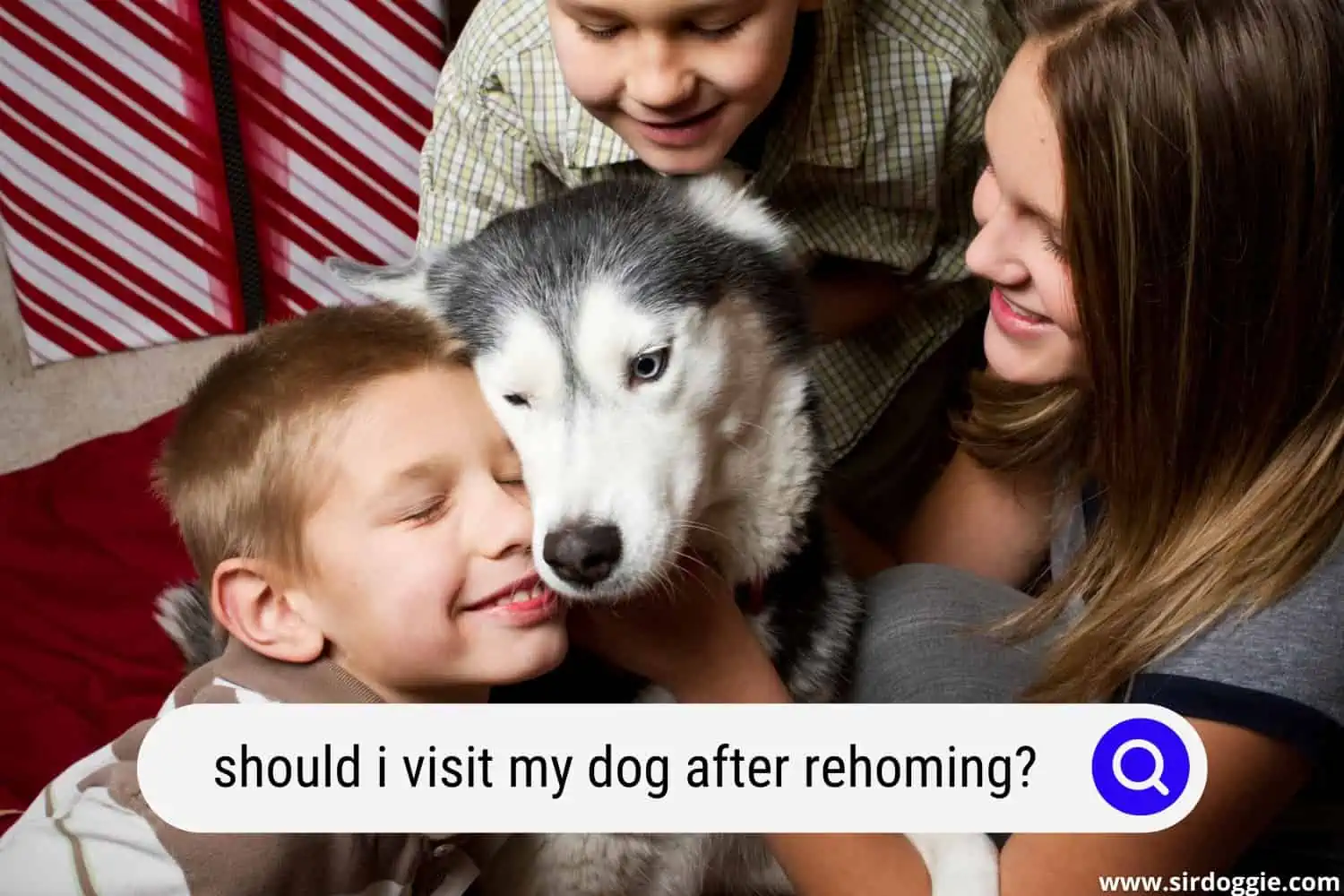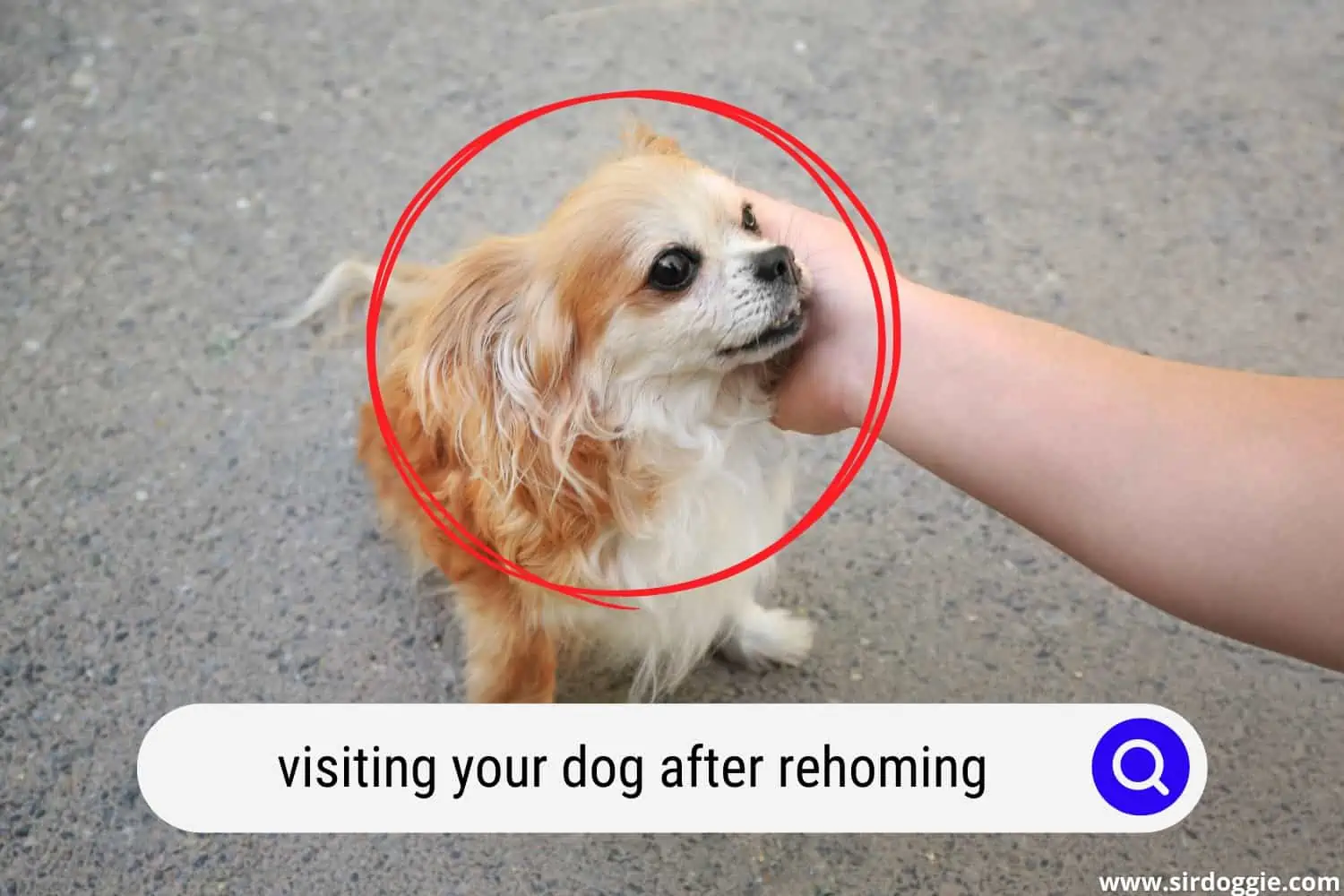Should I Visit My Dog After Rehoming? (3 Reasons)
Situations vary, and sometimes certain things in life just occur. You may find yourself needing to relocate to a new place that is not pet-friendly, or you may need to travel for business for a longer period than just a short trip, such as a trip that would require you to live in a hotel for numerous months. These instances would generally necessitate the rehoming of your canines since it’d be impossible or too difficult for them to accompany you. It may be unpleasant for you, but have you ever considered what it must be like for your dog to move from one home to another? Should you even visit your dog after rehoming?

Well, the answer is a simple no. Dog behavior experts do not recommend paying a visit to a pup that has been rehomed following the transfer to the new pet parent. This is because adjusting to a new home and environment is a lengthy and difficult process for our furry friends.
Other reasons you should never visit your dog include causing them confusion, triggering psychological issues, or impairing the amount of time required for them to adjust to their new environment. The ideal course of action is to just let the dog adjust to its new environment without interfering.
Let’s discuss in detail why it’s so important to avoid interfering with your dog’s rehoming process.
Reasons Why You Shouldn’t Visit Your Canine Companion After Rehoming
There are many reasons to avoid visiting your rehomed dog, but some of the main reasons are as follows:
1. Confusion
The primary reason to avoid visiting is that the rehomed dog is immediately confused due to the transition. They won’t know what to think or feel upon seeing you in their new home, and this will cause them to experience momentary joy before experiencing crushing despair as you are gone from their lives once more. For this reason, it is best not to approach a rehomed dog.
2. Dog adjustment timespan
It is critical to consider the dog’s total transition period before deciding to meet up with a rehomed dog. Ideally, you need to allow the dog to adjust to the new environment as long as possible.
3. Psychological issues
It’s important to understand that dogs don’t appreciate being away from their loving owners. Psychological issues such as anxiety, stress, and sadness may arise when visiting rehomed dogs. This is why it is best not to interact with your rehomed dog at all.
At first glance, visiting and interacting with them may appear to be a good idea, but in the majority of situations, it is not. You do not want to find yourself in a position where the dog refuses to eat and is unwilling to participate in any activities in its new place after seeing you again due to stress and anxiety. This will make it difficult for the pet’s health as well as cause problems for the new owners as the dog tries to adjust to its new surroundings.
Related Reading: Vizsla Dog Rescue Organizations
How does changing owners impact the animal?
This depends on various factors, including the dog’s age and how well or harshly they were handled by their previous owner. It is possible for dogs that are transitioning from one happy household to another to undergo periods of anxiety and despair. This is quite normal.
This is also the case for dogs who have been rescued from abusive or negligent situations in their previous homes. They will most likely be a little unsettled by the “new normal” as they are unsure of what to anticipate and will thus be reserved for a while. These dogs will require some time to acclimatize to their new surroundings, and they may not be active for the first 10-20 days after arriving.
What you can do if you’re the new owner
If you’re the new owner, it is your responsibility to assist them as much as possible during this transition phase. While connecting and creating familiarity with the dog is crucial, it is equally important to respect this process and provide the dog with plenty of space to adapt. Putting their container or kennel in a calm section of the home should help alleviate some of the stress caused by the situation.
Furthermore, try to surround the dog with things that they are familiar with as much as possible. You can purchase food and water bowls that are identical to those that were previously used by them. It may also be beneficial to bring something from their previous residence. This may be anything from toys to their favorite blanket. They will instantly and readily feel at ease because of the way these items feel and smell.
Even before you bring home a rehomed dog, you need to begin the process of preparing him or her to adjust to the new environment. You should prepare your home for their arrival by putting things in place. Additionally, veterinarians believe that canines are more nervous at night than they are during the day, so the trade when you acquire your new family member should take place during the day to decrease the amount of stress involved.
When the dog first arrives, you and your household members should take him or her on a tour of the house to familiarize them with the new surroundings. A trip to the restroom is an essential part of this journey. Your new dog will require time and some effort to become acclimated, but most importantly, they will require your tolerance as well, especially if they are older. Puppies require less time to adjust to their new home than older canines, who may have formed extremely deep relationships with their prior owners over time. Therefore, adult dogs require significantly more time, effort, and patience to acclimatize to their new home.

FAQs
Do dogs miss their previous owners after being rehomed?
Most dogs do not completely forget about their prior owners when they are adopted by new parents, at least not soon after being adopted. The longer a dog stays with a person or new family, the more devoted they become to those individuals.
When a dog is unexpectedly uprooted from his or her normal surroundings, he or she may appear to be moody at first. They may spend more time lying about and sleeping than is necessary. A homesick dog may even quit eating for a long period if he is not returned home.
There is no way to know what a pup is thinking or feeling since it is impossible to read his or her mind. Nonetheless, their actions and body language may be quite informative and indicative of what’s going on in their minds. There is no way of knowing how long this behavior will continue because it depends on various factors in the overall situation and the dog itself.
Is it stressful for a dog to have its owner changed?
Many people ask this question, and everyone has their advice on it. However, it is very much a harsh reality that when dogs change owners, they encounter some stress. It is always a difficult decision when you have to rehome your dog, but it is sometimes unavoidable.
How long does it take for a dog to adjust to his new home?
There are a few things you can do to assist a dog in settling in and feeling secure during those first few days of separation. However, keep in mind that it often takes around 20-25 days for a dog or puppy to begin to feel “at home” and begin to exhibit its true personality after being adopted.
How long does it take for a dog to forget about its previous pet parent(s)?
It takes 1 to 3 years for a canine companion to forget his previous owner if he or she hasn’t had any direct contact with the individual during that entire time. However, the link between experiences, scents, and noises—among other things—may allow the dog to still recognize the past relationship right away if presented with something familiar or the individual.
Related Reading: 8 Reasons Why Your Dog Bites You When You Come Home

Family Dog Expert Author
Hi there! I’m Stuart, a devoted dog lover and family dog expert with over a decade of experience working with our furry companions. My passion for dogs drives me to share my knowledge and expertise, helping families build strong, loving bonds with their four-legged friends. When I’m not writing for SirDoggie, you’ll find me hiking, playing with my beautiful dog, or studying music.